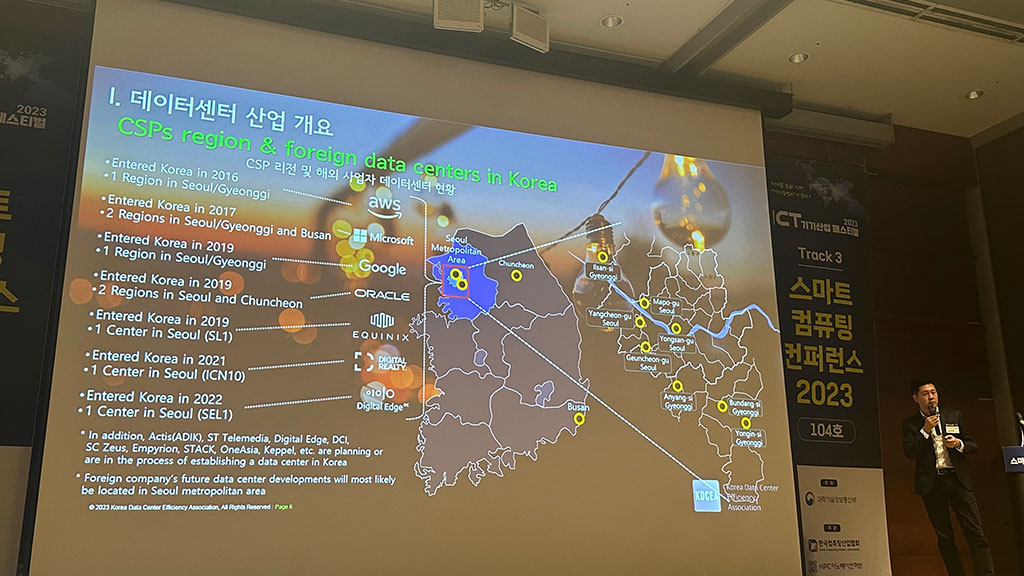초연결 시대 필수 설비인 데이터센터는 365일 무중단으로 IT 장비를 운영·관리하는 시설로, 최근 자율주행차 등 신규 서비스의 보편화로 수요가 급증했다. 데이터센터가 탄소 배출의 주범으로 꼽히면서 에너지 효율을 개선해야 한다는 목소리가 나오고 있다. 송 사무국장은 “탄소중립이 전 세계의 화두인 만큼, 환경 친화적인 데이터센터 구축 및 운영 시 RE100을 달성할 수 있는 방안을 지금부터 고민해야 한다. 이는 향후 데이터센터 경쟁력을 결정하는 중요한 요소가 될 것”이라고 주장했다.
韓 데이터센터 전력량 폭증…총 전력량의 0.9%
재생에너지 확보 위한 데이터센터 지방 분산화
하이퍼스케일러, 설비·운영 에너지 효율화 추진
‘전기 먹는 하마’라는 오명을 씻기 위한 지속가능한 데이터센터 구축 노력이 핵심 경쟁력으로 부상하고 있다.
지난 14일 삼성동 ICT 기기산업 페스티벌 ‘네트워크 코리아 컨퍼런스’에서 한국데이터센터에너지효율협회(KDCEA) 송준화 사무국장은 데이터센터의 전력 효율화가 필수 사항이 될 것으로 전망했다.

초연결 시대 필수 설비인 데이터센터는 365일 무중단으로 IT 장비를 운영·관리하는 시설로, 최근 자율주행차 등 신규 서비스의 보편화로 수요가 급증했다. 국내 상업용 데이터센터의 수는 39개(올해 말 기준)가 있으며, 2027년 약 73개로 늘어날 것으로 예측된다.
그러나 데이터센터는 GPU 서버가 밀집돼 있어 소비 전력이 막대한 데다 높은 서버의 열을 낮추기 위한 냉방 전력량도 40%에 달하는 것으로 나타났다. KDCEA에 따르면, 2021년 국내 상업용 데이터센터의 연간 전력 사용량은 약 4,808GWh로 추정된다. 이는 국내 총 발전량의 약 0.9%를 차지하는 양이다.
이에 데이터센터가 탄소 배출의 주범으로 꼽히면서 에너지 효율을 개선해야 한다는 목소리가 나오고 있다. 송 사무국장은 “탄소중립이 전 세계의 화두인 만큼, 환경 친화적인 데이터센터 구축 및 운영 시 RE100을 달성할 수 있는 방안을 지금부터 고민해야 한다. 이는 향후 데이터센터 경쟁력을 결정하는 중요한 요소가 될 것”이라고 주장했다.
‘RE100’은 기업이 사용하는 전력의 100%를 재생에너지로 전환하는 것을 목표로 하는 국제적인 기업 간 협약이다. RE100은 자발적인 협약이지만 이를 달성함으로써 환경에 미치는 영향을 최소화하는 ‘지속가능한 데이터센터’에 가까워질 수 있을 것으로 기대됨에 따라 많은 기업들에 요구되고 있다. 이외에 ‘전력효율지수(PUE, Power Usage Effectiveness)’ 등의 지표에 대응하기 위한 기업들의 노력이 가시화되고 있다.
송 사무국장은 지속가능한 데이터센터 구축을 위해 데이터센터의 지방 분산이 불가피하다고 말했다. 현재 국내의 데이터센터는 대부분 고객이 모여 있는 수도권에 몰려 있지만, 서울시 내에는 더 이상 데이터센터를 지을 수 있는 부지를 찾기가 힘들고, 찾아도 수익성 확보가 어렵다.
정부는 데이터센터의 서울·경기 쏠림 현상을 해소하고자 지난 3월 전기사업법 시행령을 개정해 데이터센터에 대한 신규 전력 공급을 거부할 수 있는 근거를 마련했다.
송 사무국장은 “데이터센터의 RE100, PUE 등과 같은 지표를 만족하기에 수도권은 부적합하다. 당장은 어렵지만 4-5년 이후, 신재생에너지를 이용할 수 있는 여건이 좋은 곳으로 데이터 센터들이 일부 이전하지 않을까 예상한다”고 말했다.
예컨대 산업부는 해남 ‘솔라시도’에는 최대 25개 데이터센터가 들어서는 RE100 데이터센터 조성을 위해 10조원을 투자한다. 최근 신규 데이터센터는 경기, 인천, 부산 지역을 중심으로 늘어나고 있는 것으로 나타났다.
기업들은 데이터센터의 전력 효율화 활동들을 추진하고 있다. 데이터센터 역할을 수행하는 IT 서버는 줄일 수 없기 때문에, 저전력·고효율 냉각 설비를 도입하거나 신재생에너지를 사용하는 등 전력 효율 시스템을 갖추겠다는 의지를 보였다.
한전에서 전력 공급을 받는 SKT, KT, LGU+ 등 이동통신 사업자들은 RE100(LGU+는 K-RE100)에 가입했다. 특히 SKT는 지난 14일 각종 서버를 전기가 통하지 않는 특수 냉각유(油) 속에 넣어 냉각하는 차세대 열관리 방식인 ‘액침냉각’ 기술 검증에 성공했다고 밝혔다. SKT는 “인천사옥에 테스트 결과, 기존 공기냉각 대비 냉방전력의 93%, 서버전력에서 10% 이상이 절감되어 총 전력 37%가 절감되는 효과를 확인했다”고 말했다.
또한 데이터센터용 반도체의 효율을 높여 전력 효율성을 달성하는 방안도 지속적인 과제다. AI 토탈 솔루션 회사 '딥엑스(DeepX)'는 서버급 성능을 보이는 'H1' 제품 등 자사의 솔루션의 고효율, 저전력을 내세우며 데이터센터의 막대한 탄소배출을 저감할 수 있다고 밝혔다.
최근 글로벌 AI 반도체 회사 '사피온(SAPEON)'은 데이터센터용 NPU인 'X330'을 출시했다. 해당 제품은 전작 'X220' 대비 4배 이상의 연산 성능, 2배 이상의 전력 효율을 확보했다. 사피온은 "타사 동급 제품과 비교했을 때, 자체 성능 측정 결과 연산 성능은 약 2배, 전력 효율은 1.3배 이상 우수하다"고 말했다.
